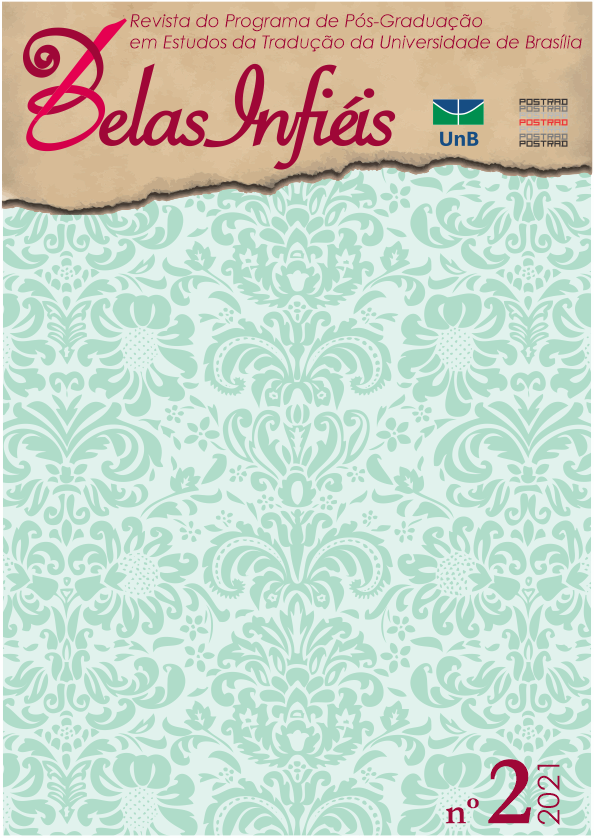Cognitive Segmentation of Translators in Training: Observation of the Translation Behaviour of German Students
DOI:
https://doi.org/10.26512/belasinfieis.v10.n2.2021.33518Keywords:
Segmentation in translation. Translation process. Translator Training. Didactics of translation.Abstract
The project “Investigating the translation competence of apprentices in training: data collection and contrasting analysis of research results at German and Brazilian university” (PVB10375-2019) sought to contribute to studies on translation competence (PACTE, 2003, 2005, 2008). From August 2019 to July 2020, the data collected in Germany in 2018 (Leipnitz & Pickbrenner, 2020) were systematized and compared with first results of the longitudinal study carried out in the Translation Course at UFPB in Brazil (Liparini Campos et al., 2015; Liparini Campos & Leipnitz, 2017; Liparini Campos et al., 2017). This paper presents an analysis of the cognitive segmentation process of German students in carrying out a translation task, organized for applied research in 2018. Data collection in Leipzig was attended by 23 subjects that translated a short technical-scientific text in the abstract format. In this, 05 students translated from English into German, the same text used in the study carried out in Brazil in 2014. Translog recorded the translation process and the steps presented here correspond to: 1) analysis of the text segmentation; 2) classification of the segments in Word, Syntagma, Clause, Clausal Complex, Transentential or Non-Syntactic Segment, according to Dragsted (2004), Rodrigues (2009), and Pimentel Neto and Liparini Campos (2017); 3) analysis of the average size of the segments produced; 4) comparison with the segmentation results of Brazilian students. The initial hypothesis that suggests similar cognitive processing among German and Brazilian students in the beginning of Translation training, was confirmed. Similar behaviours were observed by the apprentices, still attached to the source text and with more expressive cognitive segmentation in categories such as Word, Syntagma and Clause. The analysis of the cognitive segmentation of Translation apprentices was revealed to the participants of the research project as a methodological possibility in the translators training.
References
Alves, F. (2001). A triangulação como opção metodológica para pesquisas empírico-experimentais em tradução. In A. Pagano (Org.), Metodologias de pesquisa em tradução (pp. 69-93). Faculdade de Letras da UFMG.
Alves, F. (2005). Ritmo cognitivo, meta-reflexão e experiência: parâmetros de análise processual no desempenho de tradutores novatos e experientes. In A. Pagano, C. Magalhães, F. Alves (Orgs.), Competência em tradução: Cognição e discurso (pp.109-153). Editora da UFMG.
Assis, R. C., Liparini, T., & Leipnitz, L. (2018). Formação de tradutores e tradutoras: o currículo de um bacharelado em tradução. In G. H. Pereira, & P. R. Costa (Orgs.), Formação de tradutores: Por uma pedagogia e didática da tradução no Brasil, (Estudos da Tradução, vol.5, pp.301-324). Pontes.
Dragsted, B. (2004). Segmentation in translation and translation memory systems [Unpublished PhD thesis]. Copenhagen Business School.
Ferreira, A. A. (2010). Direcionalidade em tradução: uma investigação do processamento cognitivo de tradutores profissionais em tradução direta e inversa no par linguístico inglês-português [Dissertação de Mestrado, Universidade Federal de Minas Gerais]. https://repositorio.ufmg.br/bitstream/1843/LETR-8SVNBP/1/1335m.pdf
França, V. S. (2016). O processo de segmentação cognitiva de tradutores em formação [Trabalho de Conclusão de Curso Bacharelado, Universidade Federal da Paraíba]. http://www.cchla.ufpb.br/ctrad/contents/documentos/tcc-final-em-pdf-do-valber.pdf/view
Hurtado Albir, A. (2005). A aquisição da competência tradutória: aspectos teóricos e didáticos. In A. Pagano, C. Magalhães, & F. Alves (Orgs.), Competência em tradução: Cognição e discurso (pp.19-57). Editora da UFMG.
Hurtado Albir, A. (1999). Enseñar a traducir: Metodología en la formación de traductores e intérpretes. Edelsa.
Jakobsen, A.L. (2002). Translation drafting by professional translators and by translation students. In G. Hansen (Ed.), Empirical translation studies: Process and product (pp.191-204). Samfundslitteratur.
Leipnitz, L., & Pickbrenner, M.B. (2020). Das Betrachten des Übersetzungsprozesses: Primäre Ergebnisse einer Fallstudie in Leipzig. Pandaemonium, 23(40), 140-165. http://dx.doi.org/10.11606/1982-88372340140
Liparini Campos, T., Braga, C.N.O., & Leipnitz, L. (2015). Subcompetência sobre conhecimentos em tradução: Resultados da primeira fase de um estudo longitudinal. Revista Graphos, 17(1),131-145.
http://www.periodicos.ufpb.br/index.php/graphos/article/view/25054/13708
Liparini Campos, T., Leipnitz, L., & Braga, C.N.O. (2017). Avaliação da qualidade da tradução: Resultados da primeira fase de um estudo longitudinal sobre a aquisição da competência tradutória. DELTA, 3(4), 1323-1352. https://doi.org/10.1590/0102-445033559977057488
Liparini Campos, T., & Leipnitz, L. (2017). Competência tradutória: O desenvolvimento da subcompetência sobre conhecimentos em tradução. Domínios de Lingu@gem, 11(5), 1727-1745. https://doi.org/10.14393/DL32-v11n5a2017-18
PACTE. (2003). Building a translation competence model. In F. Alves (Ed.), Triangulating translation: Perspectives in process oriented research (pp.43-66). John Benjamins.
PACTE. (2005). Investigating translation competence: Conceptual and methodological issues. Meta, 50(2), 609-619.
PACTE. (2008). First results of a translation competence experiment: “Knowledge of translation and efficacy of the translation process”. In J. Kearns (Ed.), Translator and interpreter training: Issues, methods and debates (pp. 104-126). Continuum International Publishing Group.
Pimentel Neto, A. H., & Liparini Campos, T. (2017). O processo de segmentação de tradutores em formação na tradução de textos técnico-científicos. Cultura e Tradução, 5(1), 72-84. https://periodicos.ufpb.br/ojs2/index.php/ct/article/view/38499/19451
Rodrigues, R. R. (2009). Segmentação cognitiva e o uso de sistemas de memória de tradução: uma análise do processo tradutório de tradutores profissionais nos pares linguísticos alemão-português e inglês-português [Dissertação de Mestrado, Universidade Federal de Minas Gerais]. https://repositorio.ufmg.br/bitstream/1843/LETR-8T9R9Q/1/disserta__o_renata_5_.pdf
Downloads
Published
Issue
Section
License
Copyright (c) 2021 CC BY

This work is licensed under a Creative Commons Attribution 4.0 International License.
Given the public access to this journal, the texts are free to use but requires the recognition of the original authorship and initial publication in this journal to be properly stated.
 The journal allows the use of works published for non-commercial purposes, including the right to submit the work to publicly accessible databases. Published contributions are the sole and exclusive responsibility of the author(s).Â



















